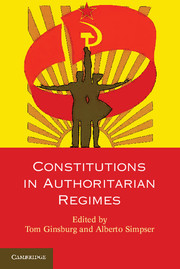Book contents
- Frontmatter
- Contents
- List of Contributors
- 1 Introduction
- Part I The Category
- Part II Constitutional Design in Authoritarian Regimes
- Part III Contents of Authoritarian Constitutions
- Part IV Consequences of Authoritarian Constitutions
- 9 The Role of Presidential Power in Authoritarian Elections
- 10 The Informal Politics of Formal Constitutions
- 11 The Party's Leadership as a Living Constitution in China
- Index
- References
10 - The Informal Politics of Formal Constitutions
Rethinking the Effects of “Presidentialism” and “Parliamentarism” in the Cases of Kyrgyzstan, Moldova, and Ukraine*
Published online by Cambridge University Press: 05 June 2014
- Frontmatter
- Contents
- List of Contributors
- 1 Introduction
- Part I The Category
- Part II Constitutional Design in Authoritarian Regimes
- Part III Contents of Authoritarian Constitutions
- Part IV Consequences of Authoritarian Constitutions
- 9 The Role of Presidential Power in Authoritarian Elections
- 10 The Informal Politics of Formal Constitutions
- 11 The Party's Leadership as a Living Constitution in China
- Index
- References
Summary
How do formal constitutions impact prospects for democratization? Most answers focus on how rules of the game in place during a transition process guide behavior in ways facilitating democratic stability, progress, or breakdown. At the same time, a growing body of work calls this entire enterprise into question by arguing that formal institutions rarely operate as assumed. The literature on hybrid regimes – political systems combining authoritarian and democratic elements – is particularly eager to stress the ways in which actual behavior deviates from the democratic formal content of a country's constitution and body of law. What matters instead is said to be informal politics, the “real” workings of politics, those unwritten and officially uncodified norms, habits, and practices that actually guide political behavior. While it is tempting to place these literatures in opposition, “formal institutions versus informal politics,” this obscures the possibility that formal institutions may impact regime change in part by altering patterns of informal politics. Indeed, an emerging body of research is now focusing on how formal rules and informal institutions interact, and recent theoretical work suggests that one of the ways that formal institutions can have political effects is by inducing change in informal rules. That is, formal institutions may still matter, but not in the way theories and practitioners often assume.
- Type
- Chapter
- Information
- Constitutions in Authoritarian Regimes , pp. 218 - 244Publisher: Cambridge University PressPrint publication year: 2013
References
- 4
- Cited by



